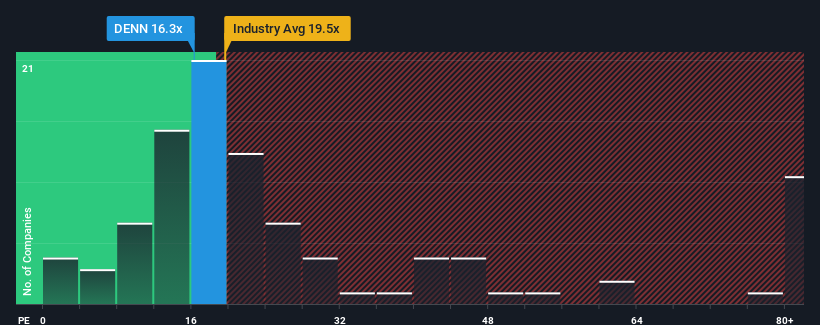- United States
- /
- Hospitality
- /
- NasdaqCM:DENN
Cautious Investors Not Rewarding Denny's Corporation's (NASDAQ:DENN) Performance Completely
It's not a stretch to say that Denny's Corporation's (NASDAQ:DENN) price-to-earnings (or "P/E") ratio of 16.3x right now seems quite "middle-of-the-road" compared to the market in the United States, where the median P/E ratio is around 18x. However, investors might be overlooking a clear opportunity or potential setback if there is no rational basis for the P/E.
With earnings that are retreating more than the market's of late, Denny's has been very sluggish. It might be that many expect the dismal earnings performance to revert back to market averages soon, which has kept the P/E from falling. If you still like the company, you'd want its earnings trajectory to turn around before making any decisions. If not, then existing shareholders may be a little nervous about the viability of the share price.
Check out our latest analysis for Denny's

Is There Some Growth For Denny's?
Denny's' P/E ratio would be typical for a company that's only expected to deliver moderate growth, and importantly, perform in line with the market.
If we review the last year of earnings, dishearteningly the company's profits fell to the tune of 52%. However, a few very strong years before that means that it was still able to grow EPS by an impressive 222% in total over the last three years. Although it's been a bumpy ride, it's still fair to say the earnings growth recently has been more than adequate for the company.
Looking ahead now, EPS is anticipated to climb by 30% during the coming year according to the eight analysts following the company. Meanwhile, the rest of the market is forecast to only expand by 12%, which is noticeably less attractive.
With this information, we find it interesting that Denny's is trading at a fairly similar P/E to the market. Apparently some shareholders are skeptical of the forecasts and have been accepting lower selling prices.
The Final Word
We'd say the price-to-earnings ratio's power isn't primarily as a valuation instrument but rather to gauge current investor sentiment and future expectations.
Our examination of Denny's' analyst forecasts revealed that its superior earnings outlook isn't contributing to its P/E as much as we would have predicted. There could be some unobserved threats to earnings preventing the P/E ratio from matching the positive outlook. It appears some are indeed anticipating earnings instability, because these conditions should normally provide a boost to the share price.
It is also worth noting that we have found 4 warning signs for Denny's (1 is a bit unpleasant!) that you need to take into consideration.
It's important to make sure you look for a great company, not just the first idea you come across. So take a peek at this free list of interesting companies with strong recent earnings growth (and a low P/E).
New: Manage All Your Stock Portfolios in One Place
We've created the ultimate portfolio companion for stock investors, and it's free.
• Connect an unlimited number of Portfolios and see your total in one currency
• Be alerted to new Warning Signs or Risks via email or mobile
• Track the Fair Value of your stocks
Have feedback on this article? Concerned about the content? Get in touch with us directly. Alternatively, email editorial-team (at) simplywallst.com.
This article by Simply Wall St is general in nature. We provide commentary based on historical data and analyst forecasts only using an unbiased methodology and our articles are not intended to be financial advice. It does not constitute a recommendation to buy or sell any stock, and does not take account of your objectives, or your financial situation. We aim to bring you long-term focused analysis driven by fundamental data. Note that our analysis may not factor in the latest price-sensitive company announcements or qualitative material. Simply Wall St has no position in any stocks mentioned.
Have feedback on this article? Concerned about the content? Get in touch with us directly. Alternatively, email editorial-team@simplywallst.com
About NasdaqCM:DENN
Denny's
Through its subsidiaries, owns and operates franchised full-service restaurant chains under the Denny's and Keke’s Breakfast Cafe brand names in the United States and internationally.
Moderate risk with moderate growth potential.
Market Insights
Community Narratives



